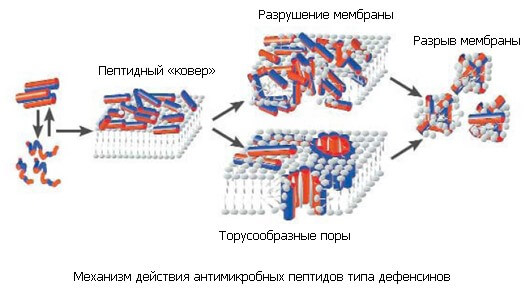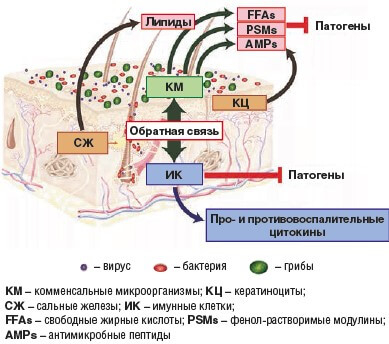Antimicrobial peptides are protein molecules of the innate immune system and are found in all organisms. They have powerful broad-spectrum antimicrobial properties and help protect the body from infections and start regeneration processes.
Antimicrobial peptides play a big role in how diseases such as psoriasis, eczema and rosacea progress.
On estet-portal.com read what functions do antimicrobial peptides perform and why they are so important for the human body, and how the level of these proteins affects course of dermatological diseases.
- Antimicrobial peptides: what are they and why are they needed
- How does the level of antimicrobial peptides change in skin diseases
- Therapeutic potential of antimicrobial peptitsdov
Antimicrobial peptides: what are they and why are they needed
Skin more than 100 antimicrobial peptides. Best known for:
- cathelicidins;
- defensins.
Cathelicidins were the first to be discovered and are widely expressed in mast cells. α-defensins and β-defensins are widely distributed in epithelial cells and phagocytes in high concentrations.

Rosacea: pathophysiological mechanisms of development of the main symptoms of the disease
Antimicrobial peptides are found in a wide variety of body tissues. In the skin, antimicrobial peptides are mainly produced by:
- keratinocytes;
- sebocytes;
- sweat glands.
They are stored in lamellar bodies (secretory granules found in the skin cell layers). Circulating immune cells, in particular neutrophils, also produce antimicrobial peptides.
Production of antimicrobial peptides is induced by growth factors and circulating immune cells.
Some antimicrobial peptides are found in normal, healthy skin.
The amount of a particular antimicrobial peptide varies depending on the level of protection required. For example, higher concentrations of the antimicrobial peptide, psoriasin (also known as calcium-binding protein S100A7 or S100A7), are found on the hands, feet, underarms, and scalp.
Antimicrobial peptides (eg LL-37) triggered by skin lesions, infections or inflammation.

The functions of antimicrobial peptides include:
- antimicrobial action – antibacterial (fights gram-positive and gram-negative bacteria), antiviral and antifungal action;
- immunomodulatory action – attraction of immune cells to sites of infection or injury;
- wound healing - the formation of new blood vessels and skin at the site of injury;
- cellular apoptosis – destroy pathogenew;
- anticancer activity.
How does the level of antimicrobial peptides change in skin diseases
In patients with atopic dermatitis (eczema) the level of antimicrobial peptides in the skin decreases. Patients with atopic dermatitis are susceptible to:
- recurrent bacterial skin infections and Staphylococcus aureus colonization;
- viral skin infections such as herpes simplex and molluscum contagiosum.
Read also: What is the secret of fast wound healing
In psoriasis, an increase in the level of antimicrobial peptides in plaques occurs. Therefore, bacterial infection is rare in psoriasis, despite significant disruption of the integrity of the skin barrier.
Antimicrobial peptides such as β-defensin 2 may play a role in the pathogenesis of psoriasis. They are thought to form complexes with their own DNA, activating the immune system and causing inflammation.
Sunlight induces antimicrobial peptides in the skin via the vitamin D pathway. This may improve psoriasis in summer.
Psoriasis treatment: experience with vitamin D
Rosacea is characterized by inflammation and vascular reactivity, which are caused by increased levelsof the antimicrobial peptide cathelicidin LL-37.
Therapeutic potential of antimicrobial peptides
Understanding the molecular elements of antimicrobial peptides could lead to a better understanding of inflammatory skin diseases and the development of new treatments.
Read the most interesting articles in Telegram!
Antimicrobial peptides:
- Possess a broad spectrum and selective antibacterial, antiviral and antifungal activity;
- Non-toxic to host cells;
- Highly conserved (i.e., antimicrobial peptide genes are found in many animal and plant species);
- Vitamin D3 and increased production of antimicrobial peptides by ultraviolet radiation can reduce infection and restore barrier function in atopic dermatitis;
- Blocking the abnormal production and/or processing of an antimicrobial peptide may be a new treatment for rosacea;
- Inhibition of antimicrobial peptide complex formation may reduce immune activation in psoriasis;
- Antimicrobial peptides may help treat inflammatory skin conditions.
The antitumor properties of antimicrobial peptides are currently not well understood, but there is speculation that antimicrobial peptides may be the key to cancer treatment.
More useful and interesting information on our channel on YouTube:







Add a comment